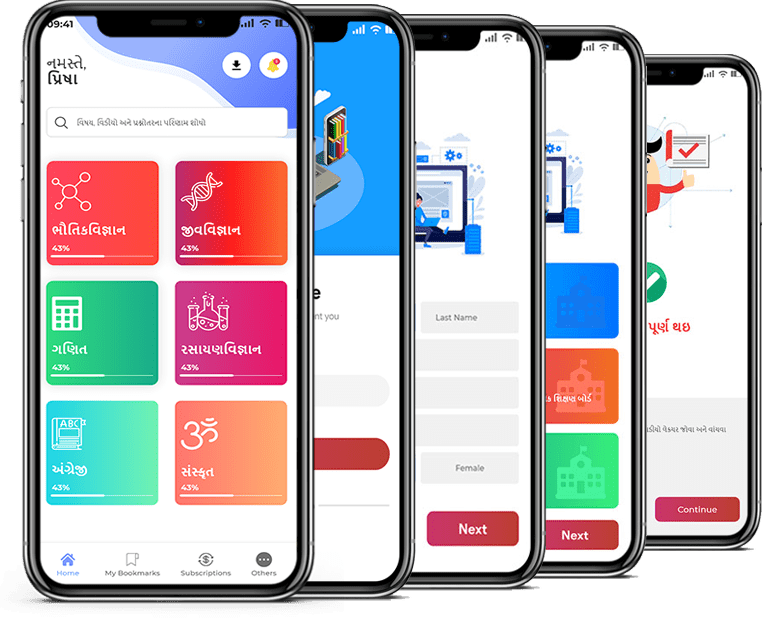GSEB std 10 science solution for Gujarati check Subject Chapters Wise::
જવાબ : They had put salt in a sugar bowl. They had splashed soup on the restaurant walls.
જવાબ : At the other restaurant, one priest had increased the amount on the bill and had broken a window deliberately.
જવાબ : Valentine was a famous Parisian detective.
જવાબ : He came to London to arrest a notorious French thief, Flambue.
જવાબ : Valentin was a famous Parisian detective. He notices small details very cleverly. He has the extraordinary ability to place himself in the shoes of the criminal he is searching for.
જવાબ : Valentin notices a series of very Strange clues left behind by a couple old priests. This made Valentin follow Flambeau’s trail around London.
જવાબ : Valentine notices a series of very strange clue left behind by a couple old priests.
જવાબ : A couple of old priests are suspected because the hints which they left in a restaurant.
જવાબ : After hearing the change of speech from Flambeau, the little old priest only turned his head slightly. It was as if he had not understood.
જવાબ : Flambeau, a smart criminal, soon understood the little old priest’s reaction and admitted that he himself was Flambeau.
જવાબ : Radiocarbon dating is a method based on radioactivity to establish the ages of various ancient natural objects and artifects.
જવાબ : Carbon 12 and Carbon 13 are the stable forms of the elements Carbon, while Carbon 14 is an unstable form of Carbon which constantly takes form and then changes in the upper atmosphere.
જવાબ : Archaeomagnetic dating is used for investigating crimes in which objects of past are taken help of. It is based on reversal of magnet field of the earth.
જવાબ : Each year changes occur within a tree by factors like rainfall, etc. These changes can be seen in form of ring patterns within the tree trunks.
જવાબ : Dating will help the investigators to understand what and when happened to objects.
જવાબ : Yes, it can be used for history also.
જવાબ : DNA is the most basic biological material that every human being has. Every cell in a human being has thousands of DNA strands and that is unique.
જવાબ : The other sources to identify DNA are fingerprint are blood, saliva and hair.
જવાબ : Investigators date objects to understand what happened around them and when it happened. It also helps to understand at what time in history a particular object was used.
જવાબ : This kind of investigations are taken up by scholars studying historical civilizations, rocks, ancient cultures or crime investigators, etc.
જવાબ : Flambeau wanted know how Father Brown, being a priest, Knew criminal tricks. Father Brown clarified that his another occupation was that of a priest and he used to hear confessions of people (including criminals) being beside the confession box.
જવાબ : Flambeau wanted to carry out his job of stealing in the disguise of a priest and that was never desirable. So Father Brown taunted him saying that he (Flambeau) attacked reason and It was bad theology
જવાબ : Advanced technology helps us to find DNA fingerprint. It is transferred on sheets in form of barcode patterns.
જવાબ : The other methods used in suspect identification are ‘photo composites’ and physical evidences like ‘bite marks’.
જવાબ : The various methods of suspect identification mentioned in the passage are as following :
- DNA analysis,
- Fingerprint,
- DNA fingerprint collected from blood, saliva, hair, etc.
- Photo composites and
- Physical evidence like bite marks.
જવાબ : For suspect identification, DNA analysis method is the most accurate method because DNA cannot be faked. DNA is unique and every person has a unique DNA. Every cell in a human being has thousands of DNA strands and DNA fingerprint can be identified using any available evidence like blood, saliva or hair.
જવાબ : Evidences like the following ones can be useful for identifying the criminal:
- Any object that the criminal has handled so that we can find his/her fingerprint on it. For example, glass of water or wine, handle of a door, a bag, a fingerprint on a cupboard, window, table drawer, etc.
- Any eatable that he/she has eaten and left it over.
- In case of murder or fight, blood marks can be useful.
- If in a scuffle a criminal’s hair is dropped or left out, it can be useful.
- If the criminal has spitted or vomited at the place of crime, that can also be of help.
- If the criminal has dropped handkerchief or left his footwear, the traces of sweat in them can also be of help for identification.
જવાબ : The scientific methods mentioned in the passage have great advantages. First of all they are foolproof. They are accurate and cannot be faked. They are not based on assumptions. They follow advance technology, so the evidences tested by them are never wrong and cannot be doubted at any cost. Secondly, for following these methods you have not to depend on any person, so no identity can be biased or partial. It is very genuine and reliable.
જવાબ : In this text, the dating technologies talked about are:
- Radiocarbon dating,
- Archaeomagnetic dating and
- Tree ring dating.
જવાબ : Dating technology is needed to date objects to understand what happened around them and when it happened. It also helps to understand at what time in history a particular object was used. Such investigations are taken up by scholars studying historical civilizations, rocks, ancient cultures or criminal investigations, etc.
જવાબ : Yes, I think there is nothing wrong in trusting dating technologies because they are based on scientific researches and they cannot be fake. Formerly dating was based on mere assumptions which cannot be relied on at any cost. But now using dating technologies have fool proofed the system and it is hundred per cent advisable to blindly trust them.
જવાબ : Results of such dating technology (tests) can be wrong only if correct data is mot stored with the investigation agency. If necessary data is stored to match with, scientific matching cannot be fake. Still, if at all, such dating tests don't match, there are several other conventional and non-conventional methods that can be taken help of.
જવાબ : Valentin was a famous Parisian (French) detective. He noticed the smallest details very cleverly. He had extraordinary ability to place himself in the shoes of the criminal. He was searching for an infamous thief and con man named Flambeau. Since Valentin did not know much about Flambeau, the chances of him were very slim but Valentin is a investigator. He manages to follow Flambeau’s around London. He observes strange things done by the two priests - one short and the other tall Valentin and two officers of London police follows them secretly Valentin overhears the talks between two disguised priests and the encounter between the two priests finally makes the arrests possible. Thanks to Valentin’s extraordinary sense to smell criminals and put them behind bars!
જવાબ : Father Brown is a Roman Catholic priest: He is very intelligent and smart all through but appears foolish both to Valentin and the criminal Flambeau. He puts salt in the Sugar bowl in a restaurant. He splashes soup on the restaurant walls. He breaks a window in another restaurant. He increases the amount of the bill three times. He also changes price labels of oranges and nuts. All these things he does deliberately to create a trail for the police. Then he starts talking with the tall priest, i.e., Flambeau. When Flambeau says that he has got the original blue cross with him Father Brown laughs it out and says that he knew the old tricks. Father Brown also tells him about the practice of criminals to keep spiked bracelets up their sleeves. Father Brown is even not afraid of Flambeau's threats as he had already switched it with the sweet box at Candy's shop and managed to send it back at its original place. When Flambeau asked him how being a simple priest, he knew so many tricks of criminals, Father Brown told that he heard a lot about men’s wrong deeds in the confession box. Thus, even without physical ability he could easily take over a hardened criminal intelligently.
જવાબ : Valentin is a famous Parisian detective. He comes to London in search of a notorious French thief flambeau. He notices the smallest details very cleverly. He has the extraordinary ability to place himself in the shoe of the criminal he is searching for because of this sense, he notices a series of very strange clues left behind by a couple of old priests. As a result he manages to follow Flambeau’s trail around London. He spots two priests at Hampstead Heath and Catches flambeau. Thus using his common sense he understands the clues left by Father Brown and succeeds in catching the thief, flambeau.
જવાબ : DNA is the most basic biological material that every human being has. Every cell in a human being has thousands of DNA strands. This DNA is unique. Every person has a unique ‘DNA Fingerprint’. This fingerprint can be identified using any available evidence like blood, saliva, etc. Even a single hair Is enough to identify it. Advance technology helps us to find this DNA fingerprint. It is transferred on sheets in form of barcode patterns. Police use these to match them to the suspects. Investigators prefer using this unfailing technique for this reason.
જવાબ : Investigators date objects and artifects for their investigations. By doing so, they understand what must have happened around those objects and when It must have happened. It also helps to understand at what time in history a particular object was used. Such investigations are taken up by scholars studying historical civilizations, rocks, ancient cultures or crimes, etc. There are various methods dating objects and artifects based on radioactivity. One method is radiocarbon dating. Radiocarbon, or carbon 14 - a form of the element carbon is unstable and weakly radioactive. Carbon 14 constantly takes form and then changes in the upper atmosphere. Plants and animals (including human beings) take in Carbon 14 throughout their lifetimes. When they die, they stop exchanging Carbon and their Carbon 14 then starts to decrease at a rate determined by the law of radioactive decay. By Knowing how much Carbon 14 is left in a sample, the age of the organism when it died can be known. Archaeomagnetic is still another method of dating.
જવાબ : Father Brown turned out to be the ‘master’ of crime in the end because those were his efforts that trapped Flambeau and got him arrested at the hands of the famous detective Valentin. Father Brown raised clues and prepared such a trap that Flambeau had to give in. Even Valentin had to concede and call him ‘master’.
જવાબ : Father Brown had spent many years with criminals so he knew it well how to trap someone. He started leaving clues by splashing soup in a restaurant, increasing the amount in the bill and breaking the window. He upset the apples and also changed labels on oranges and nuts at a market stall. He spoke lies about making a duplicate parcel. He faked himself to be a foolish priest. Finally, he left the original cross at the sweet-shop and got the lady there to send it to his friend in Westminster.
જવાબ : Flambeau was a hardened criminal and he could have stolen the blue cross at any cost, but till any strong help reached, Father Brown kept on misleading him. Actually, Father Brown had left the original blue cross at a sweet shop anticipating that it could be stolen from him anytime. Since the blue cross was not with Father Brown, even after terrible tricks to kill him, Flambeau couldn’t have managed to steal or snatch the blue cross from Father Brown.
જવાબ : Actually Valentin belonged to Paris. But he manages to follow Flambeau’s trail around London. After observing salt in a sugar bowl and splash of soup on the wall in a restaurant, on a waiter’s report, he continues to follow their trail via a market stall and a restaurant with a broken window. Eventually, Valentin reaches Hampstead Heath where she finds the simple looking priest along with a tall one and hears their conversation.
જવાબ : When Father Brown served in Hartlepool, he had met some criminals. They used to put on spiked bracelets. So when Father Brown saw Flambeau for the first time, he saw a little bulge up his sleeve and Father Brown suspected that he was a criminal.
There are No Content Availble For this Chapter
Take a Test
1. THE BLUE CROSS 2. SUSPECT IDENTIFICATION 3. DATING TECHNOLOGY
Browse & Download GSEB Books For ધોરણ ૧૧ All Subjects
- રસાયણવિજ્ઞાન Book for GSEB ધોરણ ૧૧
- ભૌતિકવિજ્ઞાન Book for GSEB ધોરણ ૧૧
- જીવવિજ્ઞાન Book for GSEB ધોરણ ૧૧
- અંગ્રેજી Book for GSEB ધોરણ ૧૧
- ગણિત Book for GSEB ધોરણ ૧૧
The GSEB Books for class 10 are designed as per the syllabus followed Gujarat Secondary and Higher Secondary Education Board provides key detailed, and a through solutions to all the questions relating to the GSEB textbooks.
The purpose is to provide help to the students with their homework, preparing for the examinations and personal learning. These books are very helpful for the preparation of examination.
For more details about the GSEB books for Class 10, you can access the PDF which is as in the above given links for the same.




